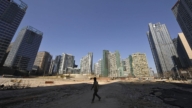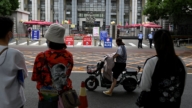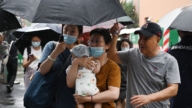【新唐人2012年1月16日訊】孟子曾經說過:商朝的紂和夏朝的桀失去天下,是因爲失去人民的支持,失去人民的支持,是因爲失去人民的心。(桀紂之失天下也,失其民也﹔失其民者,失其心也。)如今,在中國大陸,民眾抗爭維權事件層出不窮,各個社會階層的百姓都已經對中共失去信心,以至於絕望,折射出中共窮途末路、瀕臨滅亡瓦解的景象。
2011年9月,廣東陸豐烏坎村民眾敲響在法事、喜事、祭神時才用的銅鑼,為中國大陸的維權運動翻開新的一頁,上萬名群眾把剝削村民土地及權益的中共村黨支書、村委會主任驅逐村外。12月23號,村民選出了中共政權下第一個沒有共產黨的「臨時代表理事會」。烏坎村民和中共對峙僵持不下,以維權度過2012年的新年。
烏坎村效應繼續發酵,蔓延到了福建省晉江回族村,上千村民在兩週內兩次抗議貪官私吞賣地款項。
中國大陸「抗強拆」不再是零星的個別事件,過去兩年,民衆到了必須自製武器對抗當局強制拆遷。去年9月,山東臨沂市蘭山區農民以汽油桶、煙花彈、土製炸彈抵制強拆。此外,在山西、湖南、廣東、福建等地都發生了民衆土製武器抗拆維權事件。
2009年11月,成都婦女唐福珍以自焚對抗強拆,從此,大陸百姓用生命來抗議政府拆遷的事件即層出不窮;去年11月,河南鄭州一名81嵗的老太太自焚抗拆。今年1月4號,河南省洛陽市發生了兩起因強拆引發的自焚案件,一名男村民被火嚴重燒傷;另一名女村民爬上屋頂,往身上澆了汽油準備自焚被勸阻倖免遇難。
在中國,許多人抗議當局強拆,用盡所有管道卻不得結果,最終把案件帶到了聯合國, 顯示民衆已經對國內的中共政權徹底絕望,只有求助其他國家。
除了抗拆,中國還存在許多社會矛盾,如貧富懸殊、中共官員濫用權力,甚至城管也狐假虎威欺壓民衆等。
旅居外國的社會及經濟學家何清漣曾指出,中國的社會矛盾根源於中共的一黨獨大。
浙江維權人士鄒巍認爲,中國政治改革停滯不前,社會矛盾已經達到頂峰,抗拆等群衆事件,實際上是公民運動的雛形。
鄒巍:「政治體制的改革目前處於一個停滯階段實際上,那麽社會的矛盾加劇,當局在政治體制改革上無能爲力。就像我們前不久看到清華大學有一個報告說,現在進入了一個社會停滯的陷阱。現在的情況已經是比前蘇聯的所謂的『停止時期』社會矛盾更加嚴重的境地。」
而中國的知識份子也開始挑戰中共的獨裁政權,如胡佳、維權律師高智晟、陳光誠、藝術家艾未未等人。
另一方面,胡潤《2011中國私人財富管理白皮書》顯示,目前,中國已移民的千萬富豪佔14%,考慮移民的佔46%,而33%的千萬富豪擁有海外資產。根據報導,最近3年至少有170億元資金流向國外,單是2010年移民數量已增長近30%。
綜合來看,無論是從傳統的「士農工商」社會階層看,還是現代社會的上層、中層、下層的社會結構看,中國社會已經全面的唾棄中共。《尚書?泰誓中》說:「天視自我民視,天聽自我民聽。」當一個政權已經到了天怒人怨、逼得民不畏死的地步,還能有不消亡的天理嗎?
新唐人記者吳惟、王明宇綜合報導。
Losing The State Due To Losing The Peoples’Hearts
Chinese philosopher Mencius said that the regimes of Shang
and Xia lost their states for losing support from the people.
Losing peoples’support derives from losing peoples’hearts.
Today China keeps seeing incessant mass protests.
All social classes have lost confidence in the Chinese
Communist Party (CCP) regime.
The present picture of China reflects a scene of the CCP’s
dead end on the brink of collapse.
In September 2011, the Wukan villagers in Guangdong
turned a new page for China』s rights defense movements.
10,000 or more residents expelled the village’s CCP director
and secretary who were accused of illegally selling farmland.
On December 23rd, the villagers elected an Interim Council,
the first non-CCP village-elected organization in China.
The New Year 2012 was spent under the ongoing stalemate
between villagers and the CCP regime.
The Wukan village effect has expanded, reaching the Muslim
Village of Jinjiang, Fujian Province.
Within two weeks, 1,000 villagers staged two mass protests.
Local corrupt officials were accused of stealing land revenue.
“Enforceable demolitions" are no longer sporadic and isolated.
Over past two years in China, the masses were forced to use
homemade weapons against local authorities’forced eviction.
In September 2011, farmers in Linyi, Shandong province used
gasoline and homemade firework bombs, against demolitions.
Moreover, home-made weapons have been seen in forced
demolitions at provinces of Shanxi,Hunan,Guangdong,Fujian.
In November 2009, Chengdu woman, Tang Fuzhen self-
Immolated to protest at the official demolition.
Since then, numerous anti-demolition cases at the cost of
human life kept emerging across China.
In November 2011, a 81 year-old woman in Zhengzhou,
Henan,self-immolated protesting against the demolition.
On January 4, the official demolition triggered two villagers
to self-immolate in Luoyang, Henan province;
A male villager was severely burned and a female villager
climbed onto the roof, pouring gasoline over her body.
The would-be self-immolation was prevented when the
Woman was persuaded to give up the idea.
In China, all the petition channels for anti-demolition are
blocked by the authorities.
Chinese people have to petition the UN to seek international
aid, showing an attitude of sheer despair towards the CCP.
More social clashes exist in today’s China, aside from
the forcible demolition.
E.g. the sharp disparity of wealth, CCP officials’ abuses of
power, urban management officers’ bullying the masses, etc..
He Qinglian, U.S.-based sociologist & economist, said the root
cause of China’s social conflicts was CCP’s dictatorship.
Zou Wei, Zhejiang rights activist reviewed China’s current
social conflicts as prototypes of a citizen movement.
Now in China, political reform lags, social conflicts peaked,
mass protests like anti-demolition frequently broke out.
Zou Wei: “The political system reform is in fact in stagnation,
yet the social conflicts keep increasingly intensifying.
The authorities are incompetent at political system reform.
A recent report by Tsinghua University says that China is
caught up in a social stagnation trap.
Now China has a more serious situation than that during the
so-called “stagnation time" of the former Soviet Union."
Chinese intellectuals also began to challenge CCP’s
dictatorship.
Among these intellectuals are Hu Jia, human rights lawyer
Gao Zhisheng, Chen Guangcheng; artist Ai Weiwei, etc.
Hoogewerf’s 2011 China Private Wealth Management White
Paper shows 14% of Chinese millionaires have emigrated.
46% of them are considering international immigration, while
33% of millionaires own assets overseas.
In the last three years, at least 17 billion RMB was reported to
flow out of China.
In 2010 alone, the number of immigrants grew by nearly 30%.
The whole picture shows that China’s whole society; upper,
middle and the under classes, are fully shunning the CCP.
A regime like the CCP has incurred widespread indignation
and discontent, and the populace are not afraid of death.
Would such a regime escape the heaven’s punishment,
Which is its demise?
NTD reporters Wu Wei and Wang Mingyu.





























